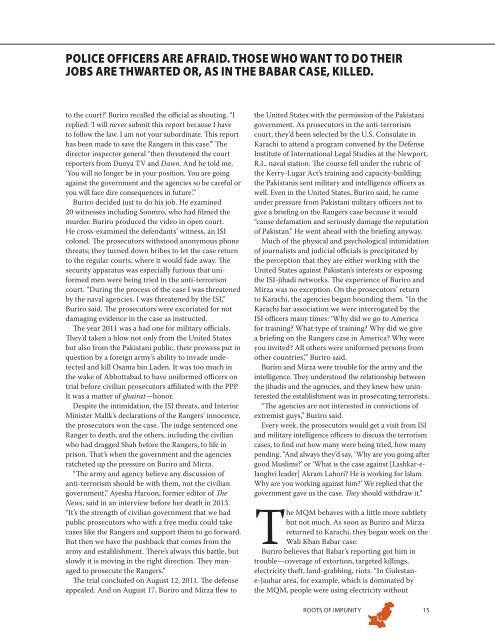CPJ.Pakistan.Roots.of.Impunity
CPJ.Pakistan.Roots.of.Impunity
CPJ.Pakistan.Roots.of.Impunity
Create successful ePaper yourself
Turn your PDF publications into a flip-book with our unique Google optimized e-Paper software.
POLICE OFFICERS ARE AFRAID. THOSE WHO WANT TO DO THEIR<br />
JOBS ARE THWARTED OR, AS IN THE BABAR CASE, KILLED.<br />
to the court?’ Buriro recalled the <strong>of</strong>ficial as shouting. “I<br />
replied: ‘I will never submit this report because I have<br />
to follow the law. I am not your subordinate. This report<br />
has been made to save the Rangers in this case.’” The<br />
director inspector general “then threatened the court<br />
reporters from Dunya TV and Dawn. And he told me,<br />
‘You will no longer be in your position. You are going<br />
against the government and the agencies so be careful or<br />
you will face dire consequences in future.’”<br />
Buriro decided just to do his job. He examined<br />
20 witnesses including Soomro, who had filmed the<br />
murder. Buriro produced the video in open court.<br />
He cross-examined the defendants’ witness, an ISI<br />
colonel. The prosecutors withstood anonymous phone<br />
threats; they turned down bribes to let the case return<br />
to the regular courts, where it would fade away. The<br />
security apparatus was especially furious that uniformed<br />
men were being tried in the anti-terrorism<br />
court. “During the process <strong>of</strong> the case I was threatened<br />
by the naval agencies. I was threatened by the ISI,”<br />
Buriro said. The prosecutors were excoriated for not<br />
damaging evidence in the case as instructed.<br />
The year 2011 was a bad one for military <strong>of</strong>ficials.<br />
They’d taken a blow not only from the United States<br />
but also from the <strong>Pakistan</strong>i public, their prowess put in<br />
question by a foreign army’s ability to invade undetected<br />
and kill Osama bin Laden. It was too much in<br />
the wake <strong>of</strong> Abbottabad to have uniformed <strong>of</strong>ficers on<br />
trial before civilian prosecutors affiliated with the PPP.<br />
It was a matter <strong>of</strong> ghairat—honor.<br />
Despite the intimidation, the ISI threats, and Interior<br />
Minister Malik’s declarations <strong>of</strong> the Rangers’ innocence,<br />
the prosecutors won the case. The judge sentenced one<br />
Ranger to death, and the others, including the civilian<br />
who had dragged Shah before the Rangers, to life in<br />
prison. That’s when the government and the agencies<br />
ratcheted up the pressure on Buriro and Mirza.<br />
“The army and agency believe any discussion <strong>of</strong><br />
anti-terrorism should be with them, not the civilian<br />
government,” Ayesha Haroon, former editor <strong>of</strong> The<br />
News, said in an interview before her death in 2013.<br />
“It’s the strength <strong>of</strong> civilian government that we had<br />
public prosecutors who with a free media could take<br />
cases like the Rangers and support them to go forward.<br />
But then we have the pushback that comes from the<br />
army and establishment. There’s always this battle, but<br />
slowly it is moving in the right direction. They managed<br />
to prosecute the Rangers.”<br />
The trial concluded on August 12, 2011. The defense<br />
appealed. And on August 17, Buriro and Mirza flew to<br />
the United States with the permission <strong>of</strong> the <strong>Pakistan</strong>i<br />
government. As prosecutors in the anti-terrorism<br />
court, they’d been selected by the U.S. Consulate in<br />
Karachi to attend a program convened by the Defense<br />
Institute <strong>of</strong> International Legal Studies at the Newport,<br />
R.I., naval station. The course fell under the rubric <strong>of</strong><br />
the Kerry-Lugar Act’s training and capacity-building;<br />
the <strong>Pakistan</strong>is sent military and intelligence <strong>of</strong>ficers as<br />
well. Even in the United States, Buriro said, he came<br />
under pressure from <strong>Pakistan</strong>i military <strong>of</strong>ficers not to<br />
give a briefing on the Rangers case because it would<br />
“cause defamation and seriously damage the reputation<br />
<strong>of</strong> <strong>Pakistan</strong>.” He went ahead with the briefing anyway.<br />
Much <strong>of</strong> the physical and psychological intimidation<br />
<strong>of</strong> journalists and judicial <strong>of</strong>ficials is precipitated by<br />
the perception that they are either working with the<br />
United States against <strong>Pakistan</strong>’s interests or exposing<br />
the ISI-jihadi networks. The experience <strong>of</strong> Buriro and<br />
Mirza was no exception. On the prosecutors’ return<br />
to Karachi, the agencies began hounding them. “In the<br />
Karachi bar association we were interrogated by the<br />
ISI <strong>of</strong>ficers many times: ‘Why did we go to America<br />
for training? What type <strong>of</strong> training? Why did we give<br />
a briefing on the Rangers case in America? Why were<br />
you invited? All others were uniformed persons from<br />
other countries,’” Buriro said.<br />
Buriro and Mirza were trouble for the army and the<br />
intelligence. They understood the relationship between<br />
the jihadis and the agencies, and they knew how uninterested<br />
the establishment was in prosecuting terrorists.<br />
“The agencies are not interested in convictions <strong>of</strong><br />
extremist guys,” Buriro said.<br />
Every week, the prosecutors would get a visit from ISI<br />
and military intelligence <strong>of</strong>ficers to discuss the terrorism<br />
cases, to find out how many were being tried, how many<br />
pending. “And always they’d say, ‘Why are you going after<br />
good Muslims?’ or ‘What is the case against [Lashkar-e-<br />
Janghvi leader] Akram Lahori? He is working for Islam.<br />
Why are you working against him?’ We replied that the<br />
government gave us the case. They should withdraw it.”<br />
The MQM behaves with a little more subtlety<br />
but not much. As soon as Buriro and Mirza<br />
returned to Karachi, they began work on the<br />
Wali Khan Babar case.<br />
Buriro believes that Babar’s reporting got him in<br />
trouble—coverage <strong>of</strong> extortion, targeted killings,<br />
electricity theft, land-grabbing, riots. “In Gulestane-Jauhar<br />
area, for example, which is dominated by<br />
the MQM, people were using electricity without<br />
ROOTS OF IMPUNITY 15


